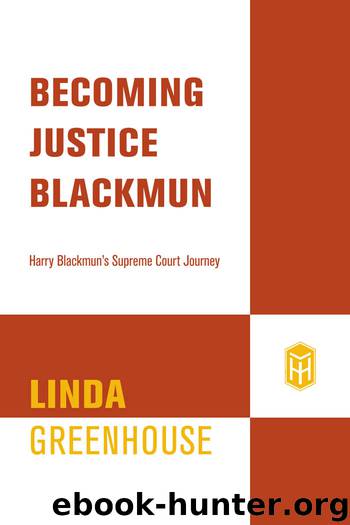Becoming Justice Blackmun: Harry Blackmun's Supreme Court Journey by Linda Greenhouse

Author:Linda Greenhouse [Greenhouse, Linda]
Language: eng
Format: epub
Publisher: Henry Holt and Co.
Published: 2007-04-01T05:00:00+00:00
The academic response to Roe v. Wade, meanwhile, ranged from tepid to withering. Within a few months of the decision, the Yale Law Journal published a scathing critique by John Hart Ely, a former law clerk to Chief Justice Earl Warren and a rising star in legal academia. In the article, “The Wages of Crying Wolf: A Comment on Roe v. Wade,” Ely asserted that “Roe lacks even colorable support in the constitutional text, history, or any other appropriate source of constitutional doctrine.” The opinion “is bad because it is bad constitutional law, or rather because it is not constitutional law and gives almost no sense of an obligation to try to be.”
Coming from a liberal supporter of abortion rights, the article drew a great deal of attention in academic circles for its authorship as well as for its caustic tone. Blackmun read it and asked his law clerk James W. Ziglar to analyze Ely’s argument. Ziglar was reassuringly dismissive. “Ely goes to great lengths to distinguish Roe from all the supposedly good things which the Warren Court did,” he wrote. “In general, this article seems to be little more than an attempt to give liberals a way of reacting adversely to the abortion decision while maintaining a firm hold on their dedication to such decisions as Miranda.” He added, “Surely, this article won’t be cited as the definitive work by anti-abortion forces.”
That prediction turned out to be well wide of the mark. By 1985, “The Wages of Crying Wolf” had become the fifth-most-cited article published in an American law review during the previous forty years. A 1991 analysis of legal literature showed it to be the third-most-cited article ever published in the Yale Law Journal. Both the Reagan administration and the administration of George H. W. Bush invoked it in Supreme Court briefs seeking to persuade the justices to overturn Roe. But Ziglar’s appraisal did prove correct in one respect: liberals in the legal academy embraced Ely’s criticism, too. Still, there were a handful of exceptions: two Harvard law professors, Laurence H. Tribe and Philip B. Heymann, published separate law review articles in the months after Ely’s article appeared, rebutting his assertion that Roe was untethered to legitimate constitutional analysis. Heymann wrote in the Boston University Law Review that Roe and Doe were “amply justified” by precedent and represented “incremental developments in constitutional doctrine” rather than the “quantum jump” that Ely derided. But Heymann’s praise for Roe was hardly unqualified. While the basis for the decision was “far more solid than it at first appears,” he wrote, that foundation was “never adequately articulated by the opinion of the Court.”
Law review battles aside, it was Ely’s critique that shaped the academic discourse. This debate—conducted almost entirely by men, at a time when women accounted for less than 3 percent of the law schools’ tenured ranks—helped make it acceptable, even fashionable, to express disdain for the opinion even in liberal intellectual circles. The result was that in its earliest years, Roe
Download
This site does not store any files on its server. We only index and link to content provided by other sites. Please contact the content providers to delete copyright contents if any and email us, we'll remove relevant links or contents immediately.
| Africa | Asia |
| Canadian | Europe |
| Holocaust | Latin America |
| Middle East | United States |
Fanny Burney by Claire Harman(26597)
Empire of the Sikhs by Patwant Singh(23074)
Out of India by Michael Foss(16849)
Leonardo da Vinci by Walter Isaacson(13318)
Small Great Things by Jodi Picoult(7122)
The Six Wives Of Henry VIII (WOMEN IN HISTORY) by Fraser Antonia(5501)
The Wind in My Hair by Masih Alinejad(5092)
A Higher Loyalty: Truth, Lies, and Leadership by James Comey(4954)
The Crown by Robert Lacey(4807)
The Lonely City by Olivia Laing(4798)
Millionaire: The Philanderer, Gambler, and Duelist Who Invented Modern Finance by Janet Gleeson(4468)
The Iron Duke by The Iron Duke(4349)
Papillon (English) by Henri Charrière(4263)
Sticky Fingers by Joe Hagan(4188)
Joan of Arc by Mary Gordon(4101)
Alive: The Story of the Andes Survivors by Piers Paul Read(4020)
Stalin by Stephen Kotkin(3957)
Aleister Crowley: The Biography by Tobias Churton(3634)
Ants Among Elephants by Sujatha Gidla(3463)
